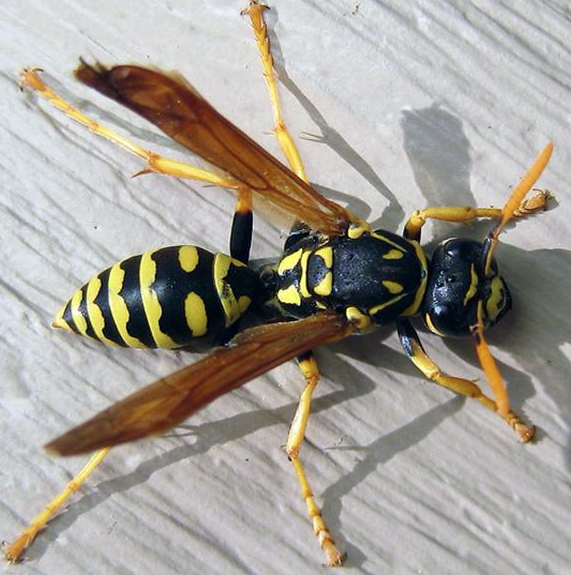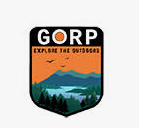If you have ever been bitten by a wasp, you know that those little creatures have the ability to inject some pain. That is why so many people go out of their way to get rid of wasps, or at least find good wasp repellents to keep them deterred.
A wasp’s sting injects a venom that makes it hurt much more – and for much longer – than a bee sting, and they tend to sting in situations where a bee might not. What’s more, a wasp can sting you multiple times (within the matter of a few seconds).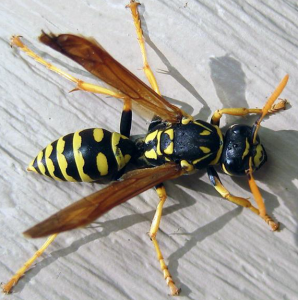
Turning to wasp repellents and other new and old techniques to get rid of wasps, there are a few things you may want to do if you have a wasp issue. Or maybe you don’t have an issue yet, but you really need to prevent one, perhaps due to allergies.
Best Wasp Repellents
Wasp repellents come in a few shapes and sizes.
The word “repellent” can mean a few different things, and we will profile a few types of wasp repellents. There are the repellents that exterminate the wasps and render a hive or nest dead after treating, and there are other repellents that simply deter wasps from setting up shop in that area.
Which type of repellent really depends on your situation and your goals. Do you prefer not to kill other creatures? Is the wasp issue past the point of a more subtle deterrent? Is there a life-threatening bee or wasp sting allergy in your family that you need to consider?
With those factors in mind, here are a few of our favorite wasp repellents.
Ortho Home Defense
Best insecticide when you need to kill wasps
If your goal is to exterminate wasps from a specific location (more below on why this option should be a last resort), we have found the Ortho Home Defense product to be the best. It does two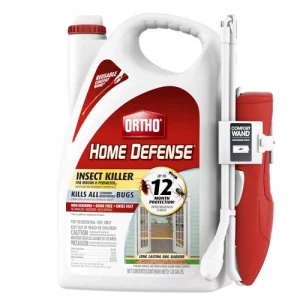 things you need a wasp killer to do: It neutralizes the wasps on contact so you don’t have risk of a painful mutiny as you are applying the spray, and the spray canisters allow for an accurate shot at the nest or hive.
things you need a wasp killer to do: It neutralizes the wasps on contact so you don’t have risk of a painful mutiny as you are applying the spray, and the spray canisters allow for an accurate shot at the nest or hive.
The Ortho sprays tend to be reliable for a good 10-15 feet, allowing you to not get too close to the next. The manufacturer says that it can reach 20 feet above the ground, but we haven’t tried it. Just don’t spray it straight above you, as the residue could drop back down into your face.
This is not an option if you want the wasps to survive. This is a lethal option.
Pros:
- Canister spray nozzle is accurate from 10+ feet away
- Neutralizes wasps on contact
- Works on hornets
Cons:
- Kills entire nest; not a deterrent, only lethal
OFF Outdoor Fogger
Best temporary yard was repellent
If your goal is to keep wasps (and other bugs for that matter) away from your yard for a few hours, the OFF Outdoor Fogger is a quality product that will do just that. This is what you might use if you are not into killing wasps, but need to keep them away for a backyard party or some gardening that you plan to do.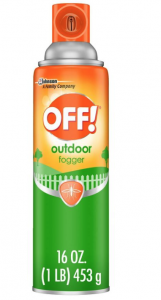
The fogger is an effective wasp repellent for up to 6 hours. You will want to apply it to lawn, dirt, mulch and other areas that are relatively benign. It is not good to use in gardens (as it can interact with your plants and flowers) and we do not recommend using it directly on a deck, as it can stain in some situations.
We like that it has a nice citronella scent, and that it works great for mosquitoes and flies too.
Pros:
- Works on much more than just wasps – flies, mosquitoes, and other bugs too
- Doesn’t kill wasps or bees, if your goal is to not harm them
- Pleasant scent
Cons:
- If you need to eliminate wasps, this doesn’t do that
- Can stain wood and siding
Citronella Sticks
Best for temporarily repelling wasps without chemicals
Next, we will talk about citronella products. Citronella is a scent that bees and wasps can’t stand, and it doesn’t harm them either. It is kind of the perfect natural solution for people who do not want to kill large colonies of wasps. 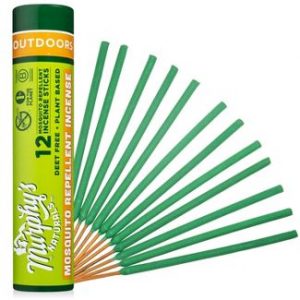
Citronella sticks are a great wasp deterrent, and work even better on mosquitoes. We just light a stick or two as we are gardening or getting ready to enjoy a glass of wine on the patio, and the sticks slowly burn, keeping wasps away. When wasps are more active in the fall looking for sugars, these are especially effective.
While it is citronella, the scent is not strong. Most people don’t mind the citronella scent, and if you just don’t want a strong scent then these sticks will work well for you. If you can’t stand any citronella, you may want to find another option.
Pros:
- Keeps mosquitoes away in addition to wasps
- Slow-burning
- Doesn’t harm the bugs
Cons:
- You may go through several in an evening
- Not great for those who dislike citronella smell
Fake Hive Nest Deterrent
Best long-term chemical-free wasp repellent
Do you want to really play jedi mind tricks on the wasps, without using any chemical or scent? We tried these fake hanging hives, and found they were pretty effective against paper wasps – the kind that build the paper mache style hanging nests.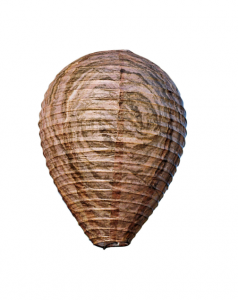
Wasps don’t like competition, and if they sense another hive in the vicinity there is a good chance they will move on. That is where this wasp deterrent comes in – it poses as a fully built out nest and signals that the territory has been staked by another colony.
You are going to need to hang the fake hive where it will not get rained on, but once you do you should notice a decrease in wasp activity. Kind of a brilliant invention and one we like, because it doesn’t rely on any chemicals.
Pros:
- Chemical-free
- Does not require reapplication
Cons:
- Needs to stay dry
- Might not fit your patio aesthetic
Mighty Mint Pest Control Spray
Best wasp deterrent for future nest building
You might be wondering how to prevent wasps from choosing your house, siding, or roof to build the nest on. We suggest using any number of longer-term repellents on the market. In an effort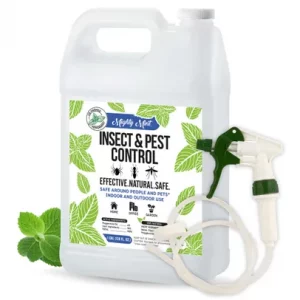 to not harm pollinators, we try to choose products that do not contain pyrethroids.
to not harm pollinators, we try to choose products that do not contain pyrethroids.
One that we have had very good luck with is the Might Mint spray. This is a spray that can be applied to siding, eaves, or patio areas. It is a plant-based spray that won’t kill wasps but will dissuade them from setting up shop on your patio or wherever you apply this. Think of it as a wasp deterrent.
We found that it works well for about 2 weeks, and then you might need to reapply. If you have a place that is a favorite of wasps and hornets to create a nest, treating it with this will probably cause them to choose a different location. If you need something with more force, you might need to go the route of a fogger. But this works for strategic applications.
Pros:
- Effective wasp repellent – will cause them to locate elsewhere
- Plant-based
- Not harmful to pollinators
Cons:
- Strong peppermint scent
- Need to reapply multiple times per summer/fall
Other Tips: How to Get Rid of Wasps
Keep a clean yard, especially in fall
Keeping your yard clean can definitely help keep wasps away. You will have the added benefit of keeping ticks away from your yard too, as they like a lot of the same habitat as mud daubing wasps.
Having a smelly garbage or sweet residue on outdoor patio furniture (think of a soft drink that may have spilled – that spill can keep wasps happy for days) will definitely attract wasps, especially in the fall.
Additionally, if you have chronically muddy areas in your yard, you are making it easier for mud daubers to do their thing. 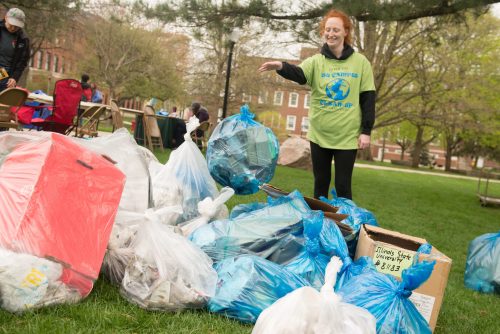
Clean trash bins
Trash bins, even empty ones, are very attractive to wasps. Wasps love sugar, and the amount of food and drink residue that clings to the side of a trash bin might not seem like much, but it can be enough for a group of wasps to feast on.
Every couple weeks, give your trash bins a good high-pressure spray with your garden hose and nozzle.
Plant Strategically
Some plants are naturally wasp-repelling, and having them around your home might reduce the number of wasps, hornets, and even mosquitoes too. We did an entire piece on wasp-repelling plants.
Clean the grill!
The residue on grills, especially if it is sweet, can definitely attract wasps. Keeping a clean grill area will help you keep wasps away.
Seal gaps
You might think that the reason to seal gaps is so wasps don’t get into your home through windows and doors, and there is some truth to that. However, the bigger problem is often gaps in your siding or along your foundation, which allow wasps to build nests inside your wall.
If you ever notice wasps inside your house and you can’t tell where they are coming from, there is a good chance they have built a nest in your wall cavity and have chewed a hole into your will.
Sealing exterior gaps not only keeps wasps out, but it also keeps mice and other rodents out.
Why Get Rid of Wasps?
Wasps can be a real nuisance for homeowners, especially those who like to enjoy their yard. Time on patios, at play areas, or in gardens can be hampered by too many wasps around.
A wasp’s sting hurts way worse than that of a bee, and them are less selective about who they sting.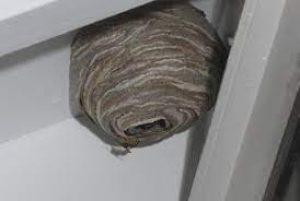
Of course, some people are allergic to wasps. For them, getting rid of wasps is not as much as nuisance issue as it is a health concern.
Types of Wasps
There are a few major types of wasps we are trying to target when we talk about using a wasp repellent. Keep in mind there are more than 30,000 types of wasps, but we are focusing on the more common nuisance ones for homeowners and families.
Paper wasps
Most common wasp in North America, they are the wasps that build the paper mache nests that hang from an eave or other structure. Quite common, and capable of living in very large colonies. There are actually a few types of paper wasps, but for laymen purposes we won’t get into all the variations.
Hornets
Hornets are wasps, and are typically larger than the paper wasps. The bald-faced hornet is the one you are likely to find in the Southeastern USA. Hornets very closely resemble yellowjackets.
Yellowjackets
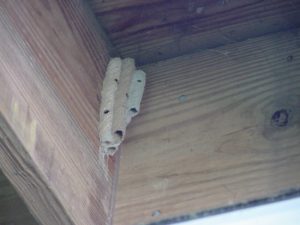
Like hornets, yellowjackets tend to be a little larger than other wasps, and are known to be aggressive. Yellowjackets like to nest in cavities – a mud mound, old tree trunks, or the wall or attic cavities of buildings.
Mud Dauber
A mud dauber is a solitary wasp that builds its nest out of mud. If you ever see a smaller mud nest on the side of a roof eave, it is probably a mud dauber. Watching a single wasp build that nest is actually a pretty neat thing to watch.
Do Wasps Serve a Purpose?
Wasps might seem like they have no purpose, but they actually have a few. In fact, in some ways, wasps are good.
First, wasps are pollinators. They are not as prolific as bees when it comes to pollination, but they do pollinate and they tend to be indifferent as to what they pollinate (whereas bees are selective).
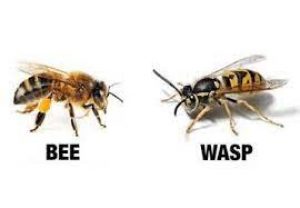
Second, wasps are very good at controlling spider and caterpillar populations. Now, you may think that you would rather encounter a caterpillar than a wasp, but for some (farmers, gardeners, etc.) an invasion of caterpillars and spiders could be a bad thing.
Wasps vs. Hornets vs. Bees
All hornets and yellowjackets are wasps, but there are thousands of types of wasps. Not all wasps are hornets or yellowjackets.
Bees and wasps, on the other hand, are different. They are similar in many ways, of course, but bees and wasps are different things.

